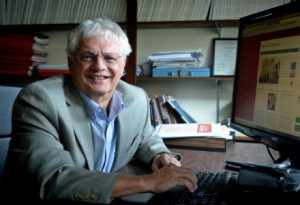
We’re now well-launched into a new academic year that offers both new opportunities and new challenges. As faculty members with diverse interests and concerns, we’ll be responding to ongoing changes within the University as well as the wider social-political context in which we work and live.
We can’t know in September all of the issues that may arise before we celebrate another commencement in the spring, but my expanding contacts with University colleagues have given me new insights into our talented community’s remarkable ability to develop creative ideas and to seek solutions to new and old problems. We are energetic people who never stop moving or changing, even as we continue to recognize our most valued past accomplishments.
The Faculty Council held a valuable meeting with new and returning members of the Council before the fall semester began, and our discussions focused specifically on the most pressing issues that faculty are facing in 2019.
Although our colleagues reaffirmed their appreciation for the public mission of our University, they also described their concerns about the current challenges that undermine faculty morale: budgetary constraints that impede the recruitment of new faculty or graduate students, departures of valued colleagues to other institutions, uncertainties about the changes in University leadership and the positions of fixed term faculty, conflicts about the meaning of free speech or campus security, and concerns about the faculty’s limited influence on external boards or government officials who directly or indirectly affect the work of the University.
The Council conversations and the committees that guide Faculty Governance will be addressing such issues in the coming months. Our goal is to ensure that we have constant faculty engagement with the University’s administrative leadership and with key decision makers outside the University. We want to explain and show how the faculty shape the intellectual ambitions for our academic community and how the faculty also serve North Carolinians through our very wide-ranging expertise, public engagement, and commitment to the highest-quality education.
I encourage you to participate in faculty conversations wherever you can add your unique voice to the discussion—from your own departmental meetings to the committees of Faculty Governance, and the public debates on important issues. An engaged, participatory academic community requires the fullest possible faculty involvement with all aspects of University life. I thank each of you for all the hard work that makes our faculty one of North Carolina’s greatest human resources.
Lloyd Kramer
Professor of History
Director, Carolina Public Humanities

